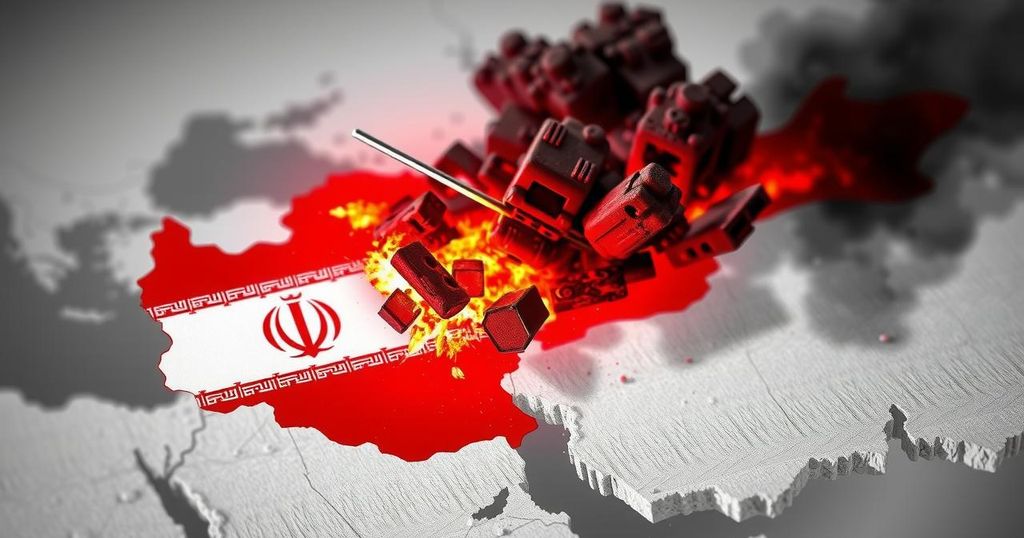Iran persists in its support for Syrian President Bashar al-Assad amidst escalating opposition advances. Recent diplomatic discussions focus on political solutions while Tehran hints at potential troop deployments if necessary. The conflict has become increasingly complex with Turkiye’s backing of opposition forces and shifting regional dynamics. Iran’s cautious rhetoric reflects the intricacies of navigating foreign interventions while preserving its strategic interests in Syria and surrounding nations.
Iran has reiterated its support for Syrian President Bashar al-Assad amid escalating military actions by opposition forces seeking to unseat his regime. Despite saber-rattling declarations regarding the potential deployment of Iranian troops to Syria, no significant military mobilization has been evidenced. Recent discussions among foreign ministers from Iran, Russia, and Turkiye have aimed at fostering political dialogue to resolve the conflict, which continues to devastate numerous Syrian cities as armed opposition groups advance their agenda.
In a statement following meetings held in Qatar, Iran’s Foreign Minister Abbas Araghchi emphasized the importance of diplomatic engagements to thwart further escalation, asserting that Iran will back Syria against entities perceived to be executing directives from foreign powers. Insisting that the conflict’s dynamics have shifted to geopolitical interests rather than ideological motives, experts highlighted Turkiye’s substantial support for anti-Assad factions is causing concern in Tehran.
The current offensive was initiated by Hayat Tahrir al-Sham (HTS), whose leader has sought to redefine the group’s image, attempting to distance it from its past affiliations with extremist elements. Iranian officials are wary of the impact this could have on regional security, particularly alongside ongoing tensions involving Israel and other foreign actors in the area. Furthermore, Iran has expressed fears that continued conflict might destabilize the already fragile balance in neighboring countries, potentially compromising Tehran’s strategic interests in Iraq and Lebanon.
While Iran maintains that its forces could be deployed if necessary, there have been no confirmed reports of such actions. An apparent shift in terminology by Iranian state media portrays the opposition forces as ‘armed groups’ instead of ‘terrorists’, indicating a nuanced approach to the evolving situation. As the rebel offensive heightens, the possibility of Iranian troops entering Syria remains a subject of speculation, with officials emphasizing the difficulties of combatting the US-supported opposition.
With the regional stakes rising and implications for surrounding nations, including the potential for humanitarian crises, the situation in Syria remains precarious. Experts suggest that, regardless of the outcomes, Syria is unlikely to see a robust and functional government in the near future, potentially leading to enduring fragmentation and conflict across the region.
The conflict in Syria, ongoing since 2011, has seen the Assad regime supported predominantly by Iran and Russia, while various opposition factions have received backing from foreign entities, including Turkiye and Western powers. The recent rise in military offensives by opposition forces, particularly led by Hayat Tahrir al-Sham (HTS), has further complicated the geopolitical landscape. Iran’s involvement in Syria has focused on maintaining its influence in the region, particularly in relation to its allies in Iraq and Lebanon, while countering perceived threats from US and Israeli interventions. Turkiye’s strategic objectives involve curtailing Kurdish militancy and securing its borders, contributing to a layered complexity in the ongoing Syrian crisis. As the conflict escalates, with prospects of further military interventions, both Iran and Turkiye must navigate their varying strategic interests while managing the delicate balance of power within the region.
In summary, Iran’s position concerning the Syrian conflict remains steadfast in its support for Bashar al-Assad, viewed in the context of broader geopolitical tensions involving the US and foreign backed opposition forces. While Iran has issued warnings regarding potential troop deployments, actual military action has yet to occur. The evolving dynamics are underscored by a shift in Iran’s rhetoric regarding armed groups, signifying possible adaptations to the complexities of the conflict. The landscape remains uncertain, raising concerns regarding regional stability and the humanitarian impact of ongoing hostilities in Syria.
Original Source: www.aljazeera.com






